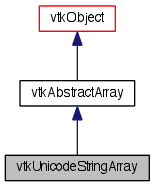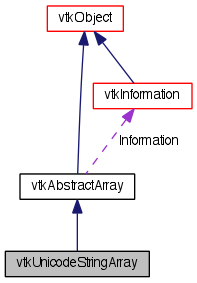Subclass of vtkAbstractArray that holds vtkUnicodeStrings. More...
#include <vtkUnicodeStringArray.h>


Detailed Description
Subclass of vtkAbstractArray that holds vtkUnicodeStrings.
- Thanks:
- Developed by Timothy M. Shead (tshead@sandia.gov) at Sandia National Laboratories.
Definition at line 41 of file vtkUnicodeStringArray.h.
Member Typedef Documentation
Reimplemented from vtkAbstractArray.
Definition at line 46 of file vtkUnicodeStringArray.h.
Constructor & Destructor Documentation
| vtkUnicodeStringArray::vtkUnicodeStringArray | ( | ) | [protected] |
| vtkUnicodeStringArray::~vtkUnicodeStringArray | ( | ) | [protected] |
Member Function Documentation
| static vtkUnicodeStringArray* vtkUnicodeStringArray::New | ( | ) | [static] |
Create an object with Debug turned off, modified time initialized to zero, and reference counting on.
Reimplemented from vtkObject.
| static int vtkUnicodeStringArray::IsTypeOf | ( | const char * | name | ) | [static] |
Return 1 if this class type is the same type of (or a subclass of) the named class. Returns 0 otherwise. This method works in combination with vtkTypeMacro found in vtkSetGet.h.
Reimplemented from vtkAbstractArray.
| virtual int vtkUnicodeStringArray::IsA | ( | const char * | name | ) | [virtual] |
Return 1 if this class is the same type of (or a subclass of) the named class. Returns 0 otherwise. This method works in combination with vtkTypeMacro found in vtkSetGet.h.
Reimplemented from vtkAbstractArray.
| static vtkUnicodeStringArray* vtkUnicodeStringArray::SafeDownCast | ( | vtkObjectBase * | o | ) | [static] |
Reimplemented from vtkAbstractArray.
| virtual vtkObjectBase* vtkUnicodeStringArray::NewInstanceInternal | ( | ) | const [protected, virtual] |
Reimplemented from vtkAbstractArray.
Reimplemented from vtkAbstractArray.
| void vtkUnicodeStringArray::PrintSelf | ( | ostream & | os, |
| vtkIndent | indent | ||
| ) | [virtual] |
Methods invoked by print to print information about the object including superclasses. Typically not called by the user (use Print() instead) but used in the hierarchical print process to combine the output of several classes.
Reimplemented from vtkAbstractArray.
| virtual int vtkUnicodeStringArray::Allocate | ( | vtkIdType | sz, |
| vtkIdType | ext = 1000 |
||
| ) | [virtual] |
Allocate memory for this array. Delete old storage only if necessary. Note that ext is no longer used.
Implements vtkAbstractArray.
| virtual void vtkUnicodeStringArray::Initialize | ( | ) | [virtual] |
Release storage and reset array to initial state.
Implements vtkAbstractArray.
| virtual int vtkUnicodeStringArray::GetDataType | ( | ) | [virtual] |
Return the underlying data type. An integer indicating data type is returned as specified in vtkSetGet.h.
Implements vtkAbstractArray.
| virtual int vtkUnicodeStringArray::GetDataTypeSize | ( | ) | [virtual] |
Return the size of the underlying data type. For a bit, 0 is returned. For string 0 is returned. Arrays with variable length components return 0.
Implements vtkAbstractArray.
| virtual int vtkUnicodeStringArray::GetElementComponentSize | ( | ) | [virtual] |
Return the size, in bytes, of the lowest-level element of an array. For vtkDataArray and subclasses this is the size of the data type. For vtkStringArray, this is sizeof(vtkStdString::value_type), which winds up being sizeof(char).
Implements vtkAbstractArray.
| virtual void vtkUnicodeStringArray::SetNumberOfTuples | ( | vtkIdType | number | ) | [virtual] |
Set the number of tuples (a component group) in the array. Note that this may allocate space depending on the number of components. Also note that if allocation is performed no copy is performed so existing data will be lost (if data conservation is sought, one may use the Resize method instead).
Implements vtkAbstractArray.
| virtual void vtkUnicodeStringArray::SetTuple | ( | vtkIdType | i, |
| vtkIdType | j, | ||
| vtkAbstractArray * | source | ||
| ) | [virtual] |
Set the tuple at the ith location using the jth tuple in the source array. This method assumes that the two arrays have the same type and structure. Note that range checking and memory allocation is not performed; use in conjunction with SetNumberOfTuples() to allocate space.
Implements vtkAbstractArray.
| virtual void vtkUnicodeStringArray::InsertTuple | ( | vtkIdType | i, |
| vtkIdType | j, | ||
| vtkAbstractArray * | source | ||
| ) | [virtual] |
Insert the jth tuple in the source array, at ith location in this array. Note that memory allocation is performed as necessary to hold the data.
Implements vtkAbstractArray.
| virtual void vtkUnicodeStringArray::InsertTuples | ( | vtkIdList * | dstIds, |
| vtkIdList * | srcIds, | ||
| vtkAbstractArray * | source | ||
| ) | [virtual] |
Copy the tuples indexed in srcIds from the source array to the tuple locations indexed by dstIds in this array. Note that memory allocation is performed as necessary to hold the data.
Implements vtkAbstractArray.
| virtual vtkIdType vtkUnicodeStringArray::InsertNextTuple | ( | vtkIdType | j, |
| vtkAbstractArray * | source | ||
| ) | [virtual] |
Insert the jth tuple in the source array, at the end in this array. Note that memory allocation is performed as necessary to hold the data. Returns the location at which the data was inserted.
Implements vtkAbstractArray.
| virtual void* vtkUnicodeStringArray::GetVoidPointer | ( | vtkIdType | id | ) | [virtual] |
Return a void pointer. For image pipeline interface and other special pointer manipulation. If the data is simply being iterated over, consider using vtkDataArrayIteratorMacro for safety and efficiency, rather than using this member directly.
Implements vtkAbstractArray.
| virtual void vtkUnicodeStringArray::DeepCopy | ( | vtkAbstractArray * | da | ) | [virtual] |
Deep copy of data. Implementation left to subclasses, which should support as many type conversions as possible given the data type. Subclasses should call vtkAbstractArray::DeepCopy() so that the information object (if one exists) is copied from da.
Reimplemented from vtkAbstractArray.
| virtual void vtkUnicodeStringArray::InterpolateTuple | ( | vtkIdType | i, |
| vtkIdList * | ptIndices, | ||
| vtkAbstractArray * | source, | ||
| double * | weights | ||
| ) | [virtual] |
Set the ith tuple in this array as the interpolated tuple value, given the ptIndices in the source array and associated interpolation weights. This method assumes that the two arrays are of the same type and strcuture.
Implements vtkAbstractArray.
| virtual void vtkUnicodeStringArray::InterpolateTuple | ( | vtkIdType | i, |
| vtkIdType | id1, | ||
| vtkAbstractArray * | source1, | ||
| vtkIdType | id2, | ||
| vtkAbstractArray * | source2, | ||
| double | t | ||
| ) | [virtual] |
Insert the ith tuple in this array as interpolated from the two values, p1 and p2, and an interpolation factor, t. The interpolation factor ranges from (0,1), with t=0 located at p1. This method assumes that the three arrays are of the same type. p1 is value at index id1 in source1, while, p2 is value at index id2 in source2.
Implements vtkAbstractArray.
| virtual void vtkUnicodeStringArray::Squeeze | ( | ) | [virtual] |
Free any unnecessary memory. Description: Resize object to just fit data requirement. Reclaims extra memory.
Implements vtkAbstractArray.
| virtual int vtkUnicodeStringArray::Resize | ( | vtkIdType | numTuples | ) | [virtual] |
Resize the array while conserving the data. Returns 1 if resizing succeeded and 0 otherwise.
Implements vtkAbstractArray.
| virtual void vtkUnicodeStringArray::SetVoidArray | ( | void * | array, |
| vtkIdType | size, | ||
| int | save | ||
| ) | [virtual] |
| virtual unsigned long vtkUnicodeStringArray::GetActualMemorySize | ( | ) | [virtual] |
Return the memory in kilobytes consumed by this data array. Used to support streaming and reading/writing data. The value returned is guaranteed to be greater than or equal to the memory required to actually represent the data represented by this object. The information returned is valid only after the pipeline has been updated.
Implements vtkAbstractArray.
| virtual int vtkUnicodeStringArray::IsNumeric | ( | ) | [virtual] |
This method is here to make backward compatibility easier. It must return true if and only if an array contains numeric data.
Implements vtkAbstractArray.
| virtual vtkArrayIterator* vtkUnicodeStringArray::NewIterator | ( | ) | [virtual] |
Subclasses must override this method and provide the right kind of templated vtkArrayIteratorTemplate.
Implements vtkAbstractArray.
| virtual vtkVariant vtkUnicodeStringArray::GetVariantValue | ( | vtkIdType | idx | ) | [virtual] |
Retrieve value from the array as a variant.
Reimplemented from vtkAbstractArray.
| virtual vtkIdType vtkUnicodeStringArray::LookupValue | ( | vtkVariant | value | ) | [virtual] |
Return the indices where a specific value appears.
Implements vtkAbstractArray.
| virtual void vtkUnicodeStringArray::LookupValue | ( | vtkVariant | value, |
| vtkIdList * | ids | ||
| ) | [virtual] |
Return the indices where a specific value appears.
Implements vtkAbstractArray.
| virtual void vtkUnicodeStringArray::SetVariantValue | ( | vtkIdType | idx, |
| vtkVariant | value | ||
| ) | [virtual] |
Set a value in the array from a variant. This method does NOT do bounds checking.
Implements vtkAbstractArray.
| virtual void vtkUnicodeStringArray::DataChanged | ( | ) | [virtual] |
Tell the array explicitly that the data has changed. This is only necessary to call when you modify the array contents without using the array's API (i.e. you retrieve a pointer to the data and modify the array contents). You need to call this so that the fast lookup will know to rebuild itself. Otherwise, the lookup functions will give incorrect results.
Implements vtkAbstractArray.
| virtual void vtkUnicodeStringArray::ClearLookup | ( | ) | [virtual] |
Delete the associated fast lookup data structure on this array, if it exists. The lookup will be rebuilt on the next call to a lookup function.
Implements vtkAbstractArray.
| void vtkUnicodeStringArray::InsertValue | ( | vtkIdType | idx, |
| const vtkUnicodeString & | |||
| ) |
| void vtkUnicodeStringArray::SetValue | ( | vtkIdType | i, |
| const vtkUnicodeString & | |||
| ) |
| void vtkUnicodeStringArray::InsertNextUTF8Value | ( | const char * | ) |
| void vtkUnicodeStringArray::SetUTF8Value | ( | vtkIdType | i, |
| const char * | |||
| ) |
| const char* vtkUnicodeStringArray::GetUTF8Value | ( | vtkIdType | i | ) |
The documentation for this class was generated from the following file:
- dox/Common/Core/vtkUnicodeStringArray.h
 1.8.0
1.8.0